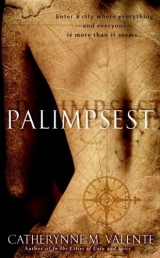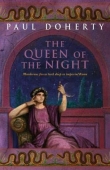
Текст книги "Palimpsest"
Автор книги: Catherynne M. Valente
Жанр:
Классическое фэнтези
сообщить о нарушении
Текущая страница: 18 (всего у книги 19 страниц)
_______
There is a blue-haired woman sitting in a wide, empty room lined with grass mats. She wears a long, unlined kimono, and her nakedness shines beneath it. Over her face is a long, red mask.
“Amaya Sei?”
“Yes.” Her voice is dull, almost drunk.
“My name is November.”
“I know. The train told me you were coming.”
“What’s wrong with you?”
“Partly I drank a great deal of rice wine so that I would not dream, and it did not work. Partly I am afraid.”
“Of what?”
“What is in the next car. I . . . I think I know. I think I know. I read a book, and I think it had my future written in it. But I am afraid. And I am so tired. It’s so hard, you know . . . to lie down under so many people. It is like taking on passengers. You get so heavy. So bare. And then there is the baby.” Sei touches her belly absently.
“What is in the car?”
Sei clears her throat and recites through her mask like a tragedian: “ When new conductors are assigned their first train, they are brought on board on a very cold winter’s night when the train is stopped and no one lingers in the cars. The senior engineers gather tightly in the conductor’s cabin. They put the earnest young man’s hands onto the control console and anoint them with viscous oil from the engine before pulling loose several wires and tying them into knots around the man’s fingers. He is then told the secret name of the train, which he may reveal to no one, and his third finger on his left hand is cut, and his blood mingled with the oil, which is then returned to circulation in the engine. In this way the train becomes the beloved of the conductor.”
“Oh. I see.”
“I think this train is lonely, and new. It’s like . . . a child. I think its parents left it when they parted ways, and it was . . . looking for me. Not me, but someone like me, for a long time. For a mother. For a conductor.”
“Sei, I have to tell you something important.”
“But I don’t know if I can bear enough men inside me, enough women in my mouth, to move with this train forever. So many . . . it’s just so many. It takes so many. My womb aches already. And I think . . . I don’t think I will really be myself, when I am the conductor. I think I will forget my name. I think my body will open up and flow along the tracks and become metal, become wire. And that means my child will become metal, and wire, and plastic, and never have a name, and never have eyes to open.”
“Isn’t it what you want? To be a conductor?”
“Yes.” Her voice breaks. “But I also want to be Sei.”
November breathes deeply; the air of the car is thin and grassy-sweet. “I need to know where you are. Just tell me where you are. In the real world.”
There is a long silence, and November can see tears drip from beneath the mask. “Kyoto. I’m in Kyoto.”
“Can you come to Rome, do you think? Could you?”
Sei shakes her head. “I don’t have any more money, really. I haven’t been to work in weeks. I can’t.”
“Okay, that’s okay, Sei. We’ll come. Just tell us where to meet you. In Kyoto. You have to tell me now, though, because on the other side I don’t speak Japanese, and it’s harder.”
“Who is us?”
“The man with the keys. And the man with glasses. And me, with the bee sting. Who were with you in the frog-woman’s shop. Who have gone down into the dark with you. Who have gone into the dark for you. We will come and get you, if you cannot come to us, and carry you into the sun. I promise.”
There is another silence, and Sei begins to shake. “There’s a shrine,” she says finally. “With orange gates, a lot of them. Outside the city. It’s called Fushimi Inari. Meet me in the pavilion. I will be there every day at sundown until you come.”
November watches as Sei reaches into her kimono and draws out an enormous, waterlogged book. She opens it at a seaweed bookmark and begins to read.
All the pages are blank.
TWO
THINGS WHICH ARE FULL OF GRACE
The man from New York came on a Tuesday, and Nerezza immediately slammed her bedroom door, refusing to even look at him. He was so thin, November could slip her fingers around his wrist entirely. But his color was high and his eyes gleamed and he had once been a handsome man. She and Ludovico met him at the door and there was a long and awful moment of quiet, knowing that anything she said to Oleg Sadakov would be inexplicable to Ludo. She would not do that to him, would not make him an outsider. Not now, not after he awoke serene, radiant—and without a tongue, blood spattering the immaculate sheets, the muscle gone as though it had never been. Nerezza stared at him for a long time, and he held her gaze. November did not want to know what their silence said.
But if Ludo did not speak, she would not. Her hands, her face, her body, all knew the grief of having been stolen, and she would spare him her old pains. November instead took them both in her arms and the three of them stood for a moment, their heads pressed together, their arms hanging limp around each other’s waists. Ludo bit his lip. He kissed the top of November’s head with a rough tenderness; she laid her head in the crook of Oleg’s shoulder.
Things which are full of grace, she thinks. Mary. Orchids. The sea when it is calm. Frost, ruins, virginity. Us. Us. We are, we are so full of it we shine.
She was hardly aware she did it, the motion was so inevitable. She led them to the long, hard couch and both men fell against her, full also of exhausted want. Oleg kissed her lightly, hesitant, unsure. Ludo held her, stroking the back of her neck, his need already pressing against her. She kissed Oleg more fervently, as though she could push prayers into him, and a cry of recognition and half-spasmic joy ripped from his lips. Oleg whispered her name, and she could hardly bear his joy in finding, in the sacrament he made of her silly name.
November tried to be the bold one, the brave one. She was not good at it—she fumbled with belts and angles, trying to open herself enough for both of them. She took Oleg in her mouth, his cock thin and hard and earnest as the rest of him, and Ludo entered her from behind as she closed her eyes, rocking back and forth, into and onto and between them. She thought, idly, that this might have been considered ugly, filthy, a slatternly thing to do. Yes, slattern, she enjoyed that word, like a thing hurled. But it felt profound to her, a completed circuit, and she knew without seeing it that Ludo and Oleg found each other’s hands over the borders of her body, and there would be time for them, too, in the small rooms of this house, time enough for all of them before Japan and the endless orange gates that waited there.
Oleg called her name again, and Ludo moaned a half-mangled, tongueless version of it, all vowels, and in their coupling and tripling was an orgy of naming, Adamic, atavistic, Edenites with a world of stars and bread and salt to name and label and list in their proper places.
Signe-de-Renvoi
THERE IS A HOLE IN THE CENTER OF PALIMPSEST.
Which is to say, there is a hole in the center of me. Surely you suspected before now who spoke. Who always speaks.
I do not mind the hole. It is like a fontanel, where all the parts of my skull come together, and do not fit exactly, not exactly, but well enough. The Albumen drains into this place, and on the other side of the world, a single stone weeps white. The river is thick and the reeds are recalcitrant enough that it long ago became a great Delta, and in this Delta is a city, a small city, a hidden and secret place within the great and sprawling city which has had so many names.
My boys are so close to it now. The gates can smell them. I have let them cheat. I held back the shadows like curtains so that they could meet before they ought to have, before they met the girl with the riverbanks on her face. I was too eager, too eager to see them together, like characters in a play. I could not wait for the fourth act. Will you forgive me? Even I require absolution, even I.
_______
There is a little harbor here, places to tie boats. All creatures need boats who are not fish, and even I am not a fish. I watch them with a dozen eyes as they knot their little ship to the pier. I watch them climb onto the long grass of the Delta. You’re here, my boys, it will be all right now, I promise. I will look after you. I always have, haven’t I?
_______
Ludovico helps Oleg up onto the strand, and there are men and women there watching them, with long, outlandish hair braided up and out like electrical wire, with smooth faces and clothes spangled in stars. They just watch, they do not move. There are houses clustered in patches like mushrooms, with round windows and broad lawns. There are strawberry gardens and cucumbers growing long and fat. It is a pleasant place. Starlight flickers over chimneys puffing sage-smoke. The Albumen crashes into the gaping hole in the center of the city a distance off, a waterfall like snow, and three little mills turn at its crest.
Oleg walks to the nearest man. He is short, mustached, his cheeks round and friendly, a pocketwatch chain dangling absentmindedly from his pocket.
“Where is Lyudmila?”
The affable man’s whiskers droop. “Now,” he says, “which would you prefer? I can pretend I haven’t the foggiest, welcome you to Signe-de-Renvoi, plate you up a nice helping of beet-greens and pan-fried koi, and pour you wine that’ll make you believe in God. We’ll have a nice evening and you can be on your way, whatever way that is. Or I can tell you that she’s just in that house there, and she’s been crying for weeks over you, and you’ll run off before I finish talking and there’ll be no beets for anyone—”
But Oleg is already gone. The man chuckles behind him, and Ludovico tries to keep up, but Oleg does not want him there. She is his sister, and the door of the little house makes a satisfying sound as he slams it in Ludo’s poor, baffled face.
Lyudmila is sitting in a large green chair, and indeed she is crying, and there is a kettle on in the rear room, and beet-greens sizzling in a pan with golden, buttery koi. She looks up at him with reddened eyes.
“Tell me why,” he says softly.
“Why what?” She sniffles, wiping her nose with her sleeve.
“Why they made you. Why you came to me.”
“What do you want, Oleg? You are so difficult! You are why we have to have this place, why we have fought to carve it out of a rushing river and three blades of grass. It is so exhausting to be always guessing. I ran away because you wanted something to chase. I did not come back because you knew you did not deserve it. I am only crying because I thought you would want it.” Abruptly, she smiles brilliantly, abject joy spilling over her face. “I can be overjoyed to see you, too, or scorn you and make you grovel, I can whip you like a horse to do your penance. Just tell me, just tell me, please.”
“Mila, stop it!”
“I came to you, Oleg, Icame to you, a whole city in one body, because you were so alone, and you missed her so much. I wanted you to love me, me, the girl from Novgorod and the city, together, inseparable, the child of their mingling. I wanted you to be happy. I made shoulders and feet and breasts and hair out of the substance of you. I did my best.”
“Why me?”
Lyudmila cocks her head to one side, finchlike. “Who said it was just you? I am a Pecia. One manuscript in many pieces, many copies. I am Palimpsest, many pieces in one manuscript. I do it for everyone who weeps and longs and wants. I cannot turn my back on want. It calls me, as though I were a unicorn and it a virgin. It is the least I can do—it is so hard to get here, you know. I wanted you. You wanted your sister. It was easy for me.”
“I wanted my real sister, in the real world, as she has always been, in her red dress and her wet hair.”
Lyudmila stands and crosses to him. She takes her face in his hands and her eyes are so big, so gentle and sorry, and she kisses him like a sweetheart, like a good woman courting a lost soul. “Oleg,” she whispers, “my poor boy. My poor, poor child. There is no Lyudmila in that world. There has never been. Little Mila died before you were born and she never left the cities of the dead. She works in a hat shop there and has a little cat. You take pills to keep your hallucination away, and they do not always work, so she appears to come and go. You, in that place called New York, have seen and heard many things that are not there, and that is what they call madness.”
Oleg shudders and sobs without sound or tears against her, and she smells so much like his Mila, of wet reeds and high clouds, and he did not want to hear this, he did not want to hear it on the boat and he does not want to hear it now. He buries his face in her breast, seeking her comfort, blindly, knowing it to be true, unable to turn his heart to look it in the eye.
“We come here, Oleg. The Pecia, when we are not wanted anymore. We plant strawberries and raise goats. We make holiday cakes and marry and have our dances known to no other. We are Pecia; together we are one long book of marvelous things. But I want to be Lyudmila. We all want to be what we were made to be. It is in our nature to want such things. We are set in motion, we cannot be stopped, and we want to fulfill our part. To love the crying, wretched folk who stumble into us, into this city, into the body of Palimpsest which is also streets and avenues and cliffs and a river and a very deep hole. You tell the city so many things, secret things, like lovers curled up in its arms, in my arms. How can I give in return less than my own secret, best things?”
“I am sorry I hurt you.”
“You did not hurt me, Oleg. Unless you want to have hurt me. At your word bruises will bloom on my belly and blood will trickle from my cheeks. Or I will kiss you and tell you stories about the Prince of Drowning, who is a dashing fellow with blue boots, and we will eat fish together and plant rhubarb under the moon.”
Oleg kisses her sternum, her neck, her cheek, her eyelids. He wants to choose something brighter, shinier. Something doctors would approve of, would judge “progress.” But she is so close, and she smells like a river, and he is not a doctor. “Be her. Be my Mila. Forget, forget that you were ever a Pecia, forget everything in you that is Palimpsest and be my sister, be from Novgorod, be a dead girl who loves me. And let me forget, too. When I see you again, let me forget that I knew you were a false Mila. Let me forget that you told me she was never real. Let me believe forever that you are my own girl, who never left me. Let me forget it all. There can be no love between strangers. Be Lyudmila.”
The Pecia closes her eyes and tears tremble in her lashes. She smiles and the room quavers from the sadness of it. Oleg kisses her mouth and she returns it, hungrily, as hungrily as the dead ever are for warmth and blood and living, breathing lovers. She clutches the small of his back to her and pulls him onto the great green chair, where he can taste, on her tongue, the Volkhov, flowing muddy and sweet and deep between them.
THREE
A HOUSE OF NO WORDS
Oleg spent half a day helping November decide whether or not a suitcase was strictly necessary. They decided to err on the side of caution, and packed each of them a change of clothes and toothbrushes. She was not what he thought she would be, the thing so full of golden electricity that he could feel in Palimpsest just beyond the borders of himself. She was a ruin to look at, and he supposed he was too. They had all paid so much to cross the river before them. Two coins for each of them, perhaps so that the other one, the Japanese girl they did not yet know, could cross freely, painlessly, and the ferryman never catch her eye.
Ludo had given Oleg a small key, a present—it unlocked nothing, but was beautiful, small and exquisite, silver and old. He wore it around his neck now, and felt in small part that it was meant to fit within him, to slip between his bones somehow and force him open.
He had not seen Lyudmila in Italy. It is so much water for her to cross, he thought. She must have been frightened. It was easier to think of her keeping house in the New York apartment than to consider for even a moment what the woman who was and was not Lyudmila had said to him. Only a little while longer,he thought, and it will not be important.
Oleg ate ravenously now, eggs and bread and tomatoes and a dozen kinds of cheese, bacon and roasted chicken. He did not know how to speak to the lady of the house, the severe, shield-faced woman named Nerezza who had been there, silent and staring, at the lock, who had watched them bring a knife so close to his throat, who spoke perfect English but refused to speak it to him. Whenever he looked at her, she shrugged as if to say: I have done what I have done. Eat my food, take my home, you can do no more to me than has already been done.
Their days, for the moment, were mainly stolen kisses and laughter and long stretches of wrapping themselves around each other. November did not often talk to him, as she could not talk to Ludo, and so the barriers seemed natural to extend. They became not barriers, but a house of no words that sheltered them all. Oleg always brought November tea afterward. He wanted to. He needed to, to serve her, to be her Pecia, to be enough that what she had done to bring them all this far, what she had lost, had been worth it.
Ludo took him walking in the ruins, and though he did not speak, their kisses were frank and unfettered behind cypress and oak and grapevine, and the light, the light in those places was the impossible light of the rafters of heaven, and such lamps showed through, such lamps, and such laughing.
Signe-de-Renvoi
THE CITY SQUARE OF SIGNE-DE-RENVOIlooks out onto the great fall of the Albumen into the earth, ringed in both fig trees and pomegranate trees, so that the air is always sharp and rich and sweet. There are dances there, and when the skirts swirl under the high, high moon, there is nothing in the world like the blue lace that shows beneath them. A charming, handsome woman of a certain age keeps everyone’s glasses full, a champagne brewed from pears and frozen grapes. Her hair is so long she has braided it all the way around her body, twice, and this serves as enough clothing for her. She has a pet, a stately old tiger with his claws long pulled, his teeth long fallen out. He is a relic of tigerhood, a bygone age when great cats knew calculus and dactylic hexameter and held a court of dreams in the jungle.
She has forgotten her name. I brought her here so very long ago, and when she died I made a copy, and another, and another. She could not speak when she lived, and I have not felt right making her copies speak, and so we have never conversed but in the silent ways of lovers. Sometimes I think that the war struck half my people dumb in her name, in her honor. But that is surely fancy.
The tiger lived, though, and I cannot explain that but I feel close to him, comradely. We have both lived so long, we old cats. We court of dreams.
I do not know why I have done these things. I do not always know why I behave as I do. Does anyone?
But I cannot let her go.
She is there tonight, dancing naked with her braids undone and flying like black serpents. I watch her in the body of an affable man with a loose pocketwatch chain, through his grandfatherly eyes, his age and his wisdom. I dance with her in his feet, and in her perfect ear I whisper the name I know but that she has lost like an earring:
Chanthou, Chanthou, my love, my wife.
_______
Ludovico watches the village dance. He would like to join in, but he does not feel right about it. He stands by the pier waiting for Oleg, patiently, as only he can be patient.
Which is not very patient,he reminds himself. But for Oleg I can try.
“And not for me?” comes a voice across the grass, and he knew it would come, he had prepared for it, he had tested its weight on the river and found that he thought he could bear it.
Lucia stands near him in a yellow dress, the dress of Ostia and the pecan-colored couch. Her skin is lion-golden and her hair a riot of loose, dark curls. He says nothing to her—he cannot. The mound of his severed tongue still aches in his mouth.
You are not Lucia,he thinks. Please don’t tease me. You’re not her.
“Of course not,” Lucia says as though he spoke. “She would never come here. It is not . . . within her circuit of fashion.”
She steps into his arms with all the natural grace of a long-wed woman, and their kiss is genuine if she is not, deep and long, and he takes great good from it.
“I’m not Calypso, if that’s what you’re thinking,” she says.
He laughs despite himself. It is a broken sound, like a plate falling. Even in this, she is a perfect copy—she presents the classical reference like a gift, a way of explaining herself, and so it is a gift.
“I do not come to offer you immortality and love of me until the riotous death of the magnetic poles in exchange for your humanity. There are no such choices. I am an honest city, I think you can at least grant that.”
He nods, and holds her hand as they walk along the little wharf.
“I want to give you what you need, Ludo. It is important to me, as I think you and I will shortly be friends for a very long time. You gave your voice for me, like the mermaid in the fairy tale. I was charmed. I was wooed. I admit it. And you are so close to me now, it is like Christmas Eve. Don’t you feel it?”
He nods, helpless to do more. They are quiet, and she skips a stone or two down the cream-churned river.
She stops and stands on her tiptoes to look him in the eye. She is so young and her brow is so clear. There are no frown lines in her.
“Are you ready?” she says, and her voice is strong and steady. “I love you. I have loved you for nine years, and I knew it was nine and not eight. I only said that to hurt you. That summer in Ostia was the core of us, and it was shining and warm and the color of pecan shells. All of this I did in a frenzy, a madness, but it did not touch us, in our walls, our lair. There, I was yours alone, and I was happy. I am your beast, and you are my saint, and I forgive you, for that is what noble beasts do, and I am a noble beast. And beasts forget, too. It is only the sadness of saints that they cannot.”
She kisses him, and her breasts are warm and soft against his body. “I love you, and I am your wife, and I forgive you of all the sins of this world, all the sins we invented just to commit within our cave. I love you,” and the light of her eyes seems to shift to something darker and cleverer than his Lucia, something vast and old. “I love you, Ludovico. In a world without end. I love you.”
She walks away from him, up the low rise toward the dancing and the lights, and she is carrying her sandals by the straps as she did when last he saw that dress, the torchlight on her hair like an absolution.
FOUR
THE FAVOR OF VESTA
I will never forgive you,” Nerezza said, clutching her wrist in her hand so tightly that it left red crescent moons in her skin. They had gone for coffee, because she could not bear the house.
Ludo tried to smile at her, his eel-girl, lost in the brumey water, circling herself in the dark.
“I have had to listen to the three of you fucking and laughing for days,” Nerezza snapped, “and I am sick to death of you.”
He was quiet for a long while. Why had he not taken them to his apartment? Because it is Lucia’s place, and it is pleasant to be among people who know the same secrets. Agostino, Anoud. Even Nerezza.
Ludo took out a pad of paper and a pen. He wrote, in fine, even lines:
Is that why you gave us up to Ululiro and those men? To be rid of us?
Nerezza shrugged. She did not look away; she was not ashamed. “Why should you be different? Why should the rest of us be chained to the earth while you go free? I have done what I have done. It is mine to own and pay for. You lived.”
He reached for her hand, and she bore that touch, and so he thought perhaps she was not utterly lost to him.
He wrote: It is not so easy for me after all, you see.
“I do see,” she relented. “But I do not forgive you. And you should not forgive me.”
Ludo wrote: I want to give you what you need, Nerezza. It is important to me.
“You haven’t the first idea what I need, Ludo. How dare you?”
He squeezed her hand and lifted it to his lips, kissed it, held it as though with that hand, all he was allowed, he could hold all of her. Ludovico let her hand fall and wrote furiously:
Have I ever told you why I go to the Forum? I go to look at the temple of the Vestals. They lived there, secluded, not just virgins, though that was important, but keepers of wills and historical papers. They wore white; they wore their purity like shields. They were the daughters of Vesta, Vesta, who kept the hearth. And as long as they were inviolable, the city was kept safe, kept whole. Forever. And maybe if they had—because they failed, sometimes, because they were young and they could not choose their nunnery, and they were punished for it, even killed—Rome would not have lost the favor of Vesta and fallen into the dark. Because it was the hearth-goddess who left them without light, without fire. Do you understand?
Nerezza’s eyes were full of tears, but they did not fall, they were hard, harder than anything he had within him. Her eyes were sharp and dark, reflected into crystal. She shook her head.
They could not live in the city, Nerezza. They could not drink at the festivals, or take lovers in alleys, or eat mackerel in the market. But without them, the city fell into the dark and the cold, into a hole in the world. Because they were inviolable, the city lived within the circuit of their skin, and they kept it safe, like a mother, like a goddess.
She was crying in earnest then, angrily, harshly, without sound, without forgiveness, but she did not let go of his hand. He kissed her and kissed her again, and slowly, with a small smile, as though it was a joke shared long ago between them, he kissed the tears from her cheek with his round mouth.
_______
Ludovico left her in the café, drying her face, composing it again into eelskin and electricity. He stepped into his taxi and sped off through the Roman streets toward the airport, washed with light, past the ruins of ruins, the city built on its own grave, built out of itself, time and again, a world without end.








